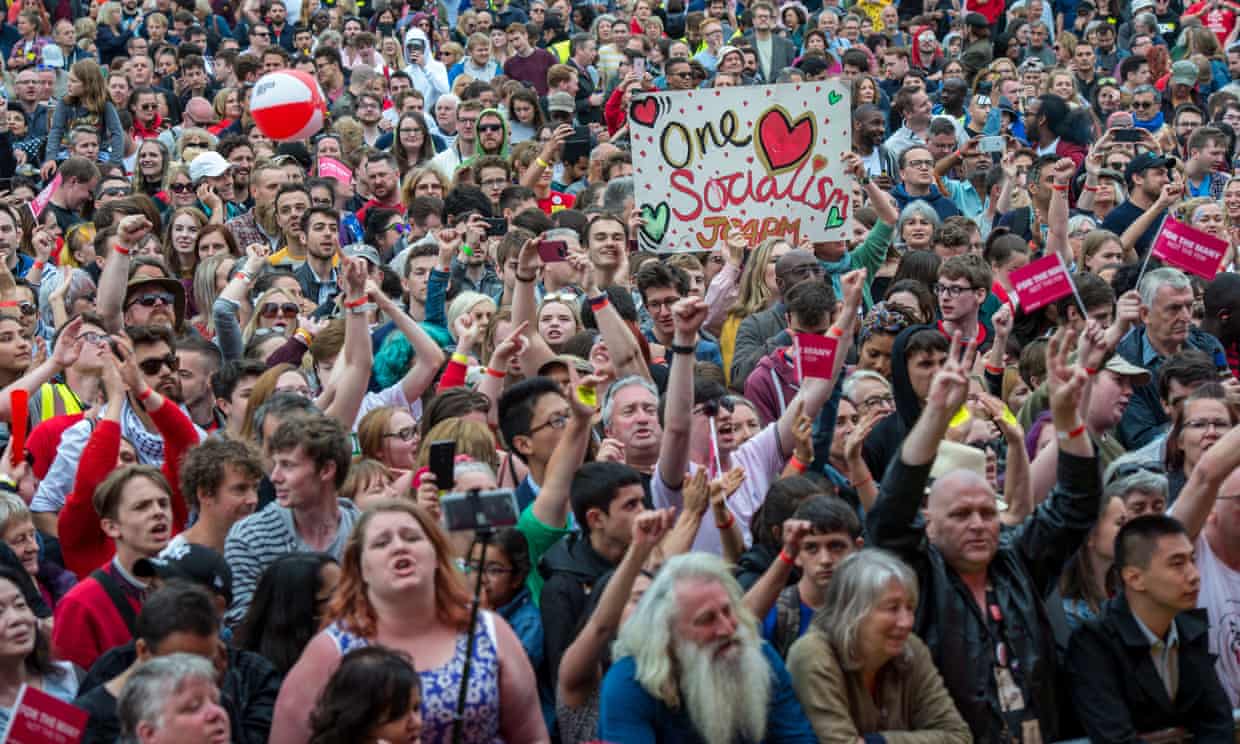|
'You can have a voice': political festivals on the rise in UK

The crowd at Labour Live in London, which attracted 13,000 people in June.
Photograph: Chris J Ratcliffe/Getty Images
t was mercilessly lampooned last summer as the “Tory Glastonbury” – a paddock of largely male Conservative supporters in red chinos who could only dream of aping the adulation Jeremy Corbyn received from young fans at the music festival months earlier.
The vision behind the Big Tent Ideas festival, brainchild of the Tory MP George Freeman, was to to connect the party with young people and build a centre-right movement to propel it forward. One year on, however, the festival has returned with a new strategy.
“It’s totally different. I have made it non-party political so that MPs, peers and others from the centre left can also get involved,” said Freeman. The event, he added, was part of a wider initiative to travel the country announcing bursaries for entrepreneurs with the most radical ideas.
Freeman claimed as many as 17 Labour MPs had been due to attend the event but pulled out after pressure from their party’s HQ. Two of those he named, Ian Austin and Clive Lewis, said constituency and shadow cabinet commitments were the reasons they would not be attending.
Lewis said: “Whilst flattered to be invited to speak in most public debates, whether I was available or not for ‘Tory Glastonbury’, I’d still have to consider if I was willing to be showcased at such an event. An event that is, when all is said and done, an attempt at detoxification and brand revival of the Tory party, particularly with young people.”
Saturday’s gatherings inside eight tents at Babraham Research Campus in Cambridge, with speakers on topics ranging from “Tax and State” to “Millennials – Maybe They Are More Libertarian Than We Think?”, reflect a growing appetite for “political festivalism”.
The trend has largely been powered by the left, and has been mocked in some quarters as a “Jezfest”. In June, despite a slow start on ticket sales, Labour Live attracted 13,000 people to a park in north London to hear Corbyn give a speech on policy and listen to musical acts including the Magic Numbers.
There have also been regional spin-offs of the Corbyn-supporting Momentum group’s The World Transformed (TWT), a parallel event to Labour’s annual conference that has become popular with many young, and not so young, leftwingers. Derby, Southwark in London, Bristol, Liverpool and Durham have all hosted TWT-style political events over the past year.
A desire to meet in person to engage in political discussion rather than in social media echo chambers might be one reason for the popularity of such events. The writer Maya Goodfellow, a Labour supporter, said it also derived from a notion that politics and culture should not be separate.
Goodfellow said of her experience as a speaker at Labour Live: “The thing I really enjoyed was that people came up to me afterwards and wanted to continue with the discussion after the event had officially ended, and we were able to do that.
Guardian Today: the headlines, the analysis, the debate - sent direct to youRead more“These sort of events have always been around – take Rock Against Racism – but I would argue that they’re also related to the fallout from the financial crash and the idea that they are a product of people being told ‘you can have a voice’.”
Away from party politics, other recent events seen as part of the trend include the Byline festival in East Sussex, billed as promoting independent journalism and free speech, which took place for a second year this summer.
Meanwhile, “festivals of ideas” have become part of the university landscape. Joan Concannon, the director of one such festival in York – styled as a partnership between the university and cultural, social and business organisations in the city, said its aim was to demonstrate that the institution was “not an ivory tower” and break down barriers with other communities.
“We find that people are very engaged – particularly when we have done things around, for example, the refugee crisis,” she said.
“People are genuinely concerned and, personally, I think that they like engaging more directly with speakers because they often just don’t feel they are listened to by political decision makers.”
Freeman said events like the Big Tent Ideas festival were important because “for a generation under 40 the traditional party conference is as dead as a dodo”.
“Travelling and spending days in a remote city under high security in a corporate setting is just not attractive to them,” he said.
“Secondly, I think that Brexit has created a huge frustration for young people and there is a demand for discussion about ideas. I have always insisted that there is a cultural element to politics. The left has actually been a bit better at recognising that but we are changing that.”
|
Ben Quinn, The Guardian, 09/09/2018
|
|
|
|
The Mary Initiative
A Bridge of Understanding
Operational, Safety, Security & First Aid Training for NGO's
|
|
|
|